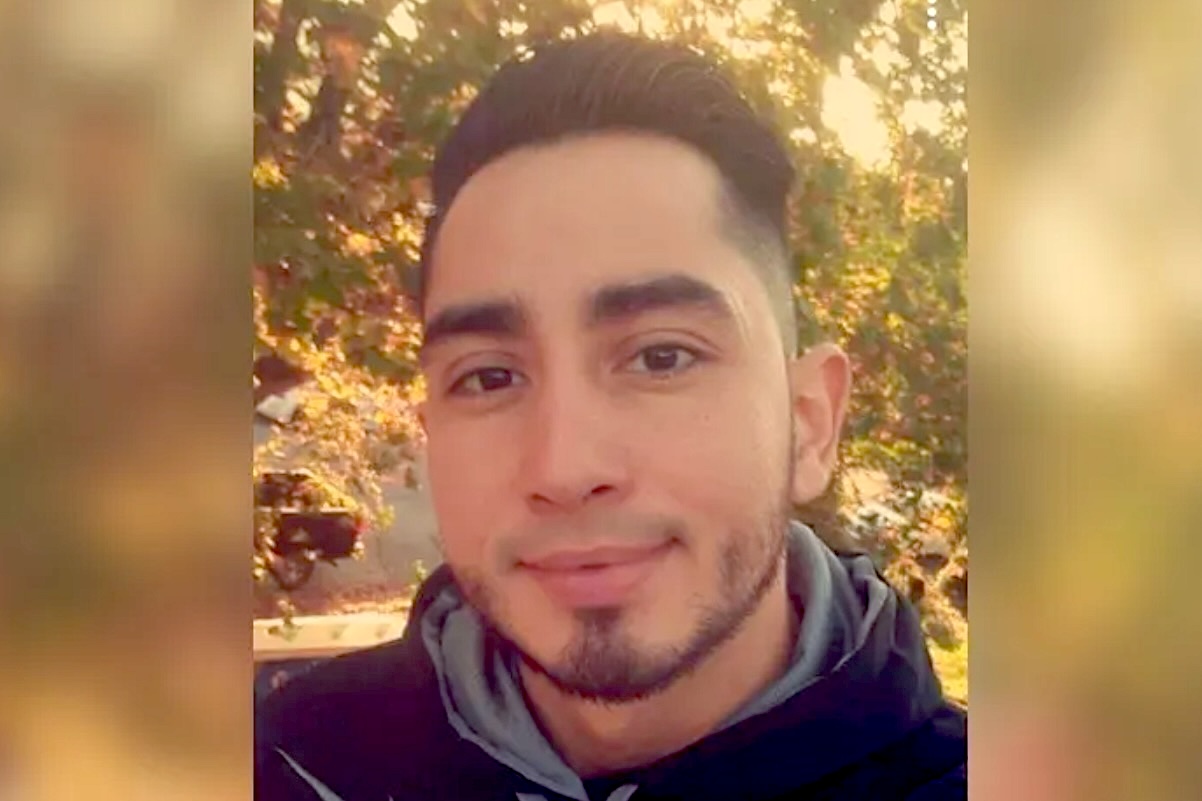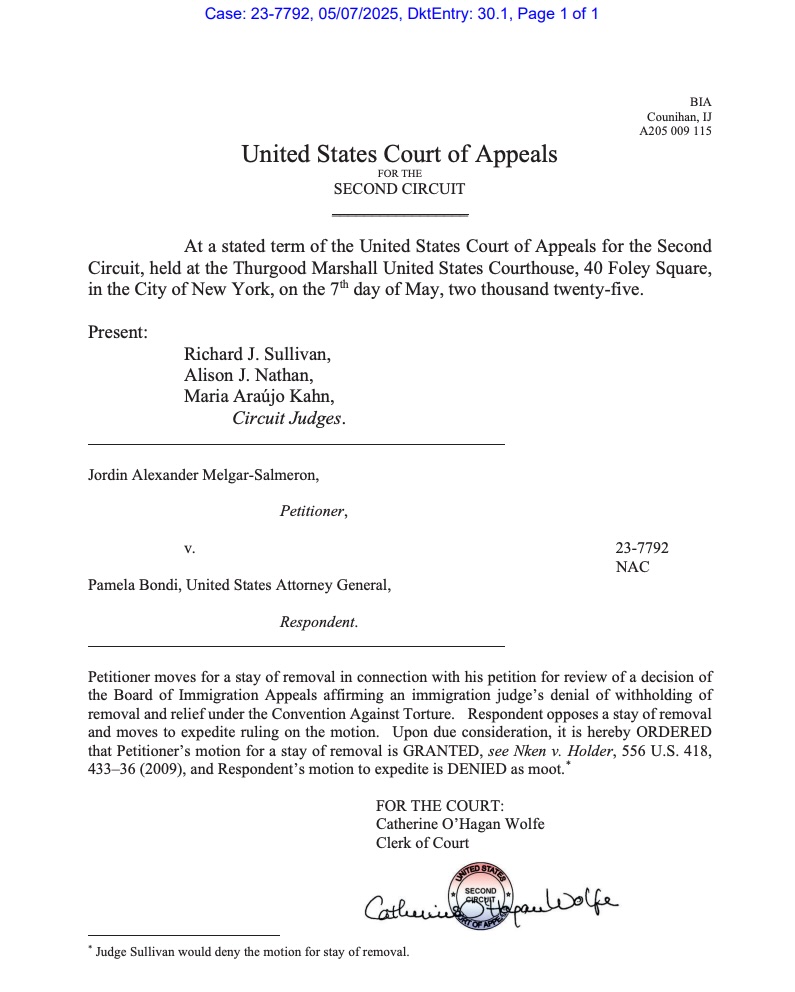For at least the second time since President Donald Trump took office, Immigration and Customs Enforcement agents deported a migrant in defiance of federal judges — this time a Salvadoran man long held in detention in Western New York.
The Trump administration’s most recent action occurred May 7. That morning, a panel of federal judges with the Second Circuit Court of Appeals in New York City granted the man, Jordin Melgar-Salmeron, permission to remain in the United States while his immigration case wound its way through the courts.
Twenty-eight minutes later, however, Melgar-Salmeron was on an ICE Air flight from Louisiana to El Salvador. In a court filing, Peter Sukmanowksi, assistant director of the Buffalo ICE office, said he notified the New Orleans office that Melgar-Salmeron was not to be deported, but only after the flight had taken off.
The case echoes that of Kilmar Abrego Garcia, another Salvadoran man who was deported back to that country despite a court order forbidding the government from doing so. The Trump administration, which has blamed Abrego Garcia’s deportation on an “administrative error,” has yet to return Abrego Garcia to the United States. El Salvador President Nayib Bukele has so far refused to release him.
Melgar-Salmeron now faces a similar fate, his attorney, Matthew Borowski, fears. On Thursday, Melgar-Salmeron’s family confirmed to Borowski that he’s being held at El Salvador’s notorious Izalco prison. In March testimony, a Human Rights Watch director said detainees there face conditions amounting to torture.
Similar to the Abrego-Garcia case, ICE officials argue in court filings that a communication breakdown left them unaware of the court’s order until after his flight had departed.
Borowski said he plans to seek criminal contempt of court charges against the Trump administration. Such a request is due in court June 2.
“Until these guys start facing real consequences for their actions they’re going to continue to snub court orders and violate law,” Borowski told Investigative Post.
The federal judges have demanded answers from the Trump administration on why Melgar-Salmeron was deported in violation of their order. Among other questions, the judges demanded to know why ICE deported Melgar-Salmeron on May 7 when the administration previously told the court it would wait until May 9. So far, the government has not answered that query.
In the government’s most recent response to the court, as in the Abrego-Garcia case, the government claims “a confluence of administrative errors” led to the deportation.
Borowski, who maintains offices in Cheektowaga and the Washington, D.C. area, doesn’t buy the government’s argument, calling the deportation “a flagrant disregard for the law.” His co-counsel, Corfu-based attorney Daniel Jackson, said the government “lied” to the court.
Immigration advocates, meanwhile, expressed outrage.
“The Trump administration is already acting as judge and jury, ignoring the court system writ large and undermining the basics of the rules of law,” said Murad Awawdeh, president and CEO of the New York Immigration Coalition. “If some of us don’t have rights in this country, none of us do.”
Melgar-Salmeron’s wife, Jamie, said their four children struggle to understand why their father isn’t coming home. She said she’s told them he’s in El Salvador, in jail, but isn’t allowed to call home. Not having him home, she said, is “a very strong trauma.”
“They ask about him every day, why he doesn’t call, when they’ll see him, when he’ll come home,” she told Investigative Post. “It’s very difficult for me to explain to them that I don’t know if they’ll ever see him again because of all the injustices happening right now.”
The Department of Justice attorney arguing on behalf of ICE, Kitty Lees, declined to comment on the deportation when reached by Investigative Post on Wednesday. A spokesperson for the Department of Justice refused to comment, too, and referred questions to ICE. An ICE spokesperson did not respond to a request for comment.
How the deportation happened
Melgar-Salmeron had been detained at the ICE detention center in Batavia since November 2022, following a stint in federal prison. His incarceration came as a result of a 2021 conviction for entering the United States without permission and possessing a shotgun — charges he pleaded guilty to. He had been living in the Charlottesville region of central Virginia and working as a roofer when a Fluvanna County deputy sheriff cited him for having open beers and the unregistered 12 gauge in his truck.
After his sentence on those charges, Melgar-Salmeron spent January through October of 2023 attempting to win his release from Batavia. Court papers describe him as “distraught that his conduct has jeopardized his children’s well-being” and say that his sole aim was to “continue to be a loving father and provider to his children and a husband to his wife.”
But immigration judges denied his bids, first in June and again in October. That’s when Borowski took his case.
In January 2024, the Biden administration sought to pause the case. Melgar-Salmeron’s appeal, the government argued, could be affected by other cases, one of which is currently before the Supreme Court. The Second Circuit ought to wait for those cases to be settled before ruling on Melgar-Salmeron’s, the Department of Justice argued.
The court agreed, and the case was paused. Melgar-Salmeron remained in Batavia.
Then, in April, the Trump administration asked the court to both restart and expedite the proceedings. In filings, the government made clear it wanted Melgar-Salmeron deported.
In an April court filing, Lees, the DOJ attorney, said the Department of Homeland Security had procured “time sensitive travel documents” that would allow the Trump administration to send Melgar-Salmeron back to El Salvador. The travel documents were good through May 9, and Lees told the judges the government would allow the case to play out until May 8. ICE scheduled the deportation for May 9.
On May 1, Borowski protested the planned deportation, asking the court to keep Melgar-Salmeron in the United States and to rule on his request quickly.
What happened next is under dispute. According to Peter Sukmanowski, assistant director of the Buffalo ICE office:
- On May 1, ICE Buffalo informed Borowski that Melgar-Salmeron was set to be deported May 9.
- On May 2, ICE Buffalo transferred Melgar-Salmeron from Batavia to Alexandria, Louisiana, where many deportation flights depart from.
- On May 6, ICE New Orleans informed ICE Buffalo that Melgar-Salmeron was scheduled to be deported the following day.
In an affidavit filed Wednesday, Sukmanowski said Melgar-Salmeron’s deportation officer never got the email.
“Due to an oversight and the volume of emails received pertaining to removal fights, the Buffalo officers who received the emails did not communicate the emails or manifests to the Assigned Deportation Officer,” Sukmanowski testified.
So, on May 7, at around 9:20 a.m., ICE New Orleans officers began boarding the deportation flight. Craig Lee, a deportation supervisor in that office, testified in his own affidavit that officers couldn’t locate Melgar-Salmeron and “assumed he was not at the facility.” ICE New Orleans then updated an internal database listing Melgar-Salmeron as a “no show” which Sukmanowski testified he later reviewed.
However, said Lee: “During the second roll call, the facility staff located in the facility and the flight officers escorted him onto the airplane.”
Then, at 9:52 a.m., the panel of Second Circuit judges ruled that Melgar-Salmeron should not be deported, allowing him to stay in the United States while his case continued.
At 10:08, according to Sukmanowski, the ICE Buffalo office received notice of the court’s ruling.
At 10:20 a.m., the flight to El Salvador including Melgar-Salmeron left the Alexandria airport.
Then, at 10:45 a.m., Sukmanowski, in the Buffalo ICE office, flagged in an internal agency system that Melgar-Salmeron should not be deported. Four minutes later, he replied to an email notifying ICE of the court’s order.
Lee, in the New Orleans ICE office, claimed in an affidavit that his office wasn’t aware Melgar-Salmeron shouldn’t have been put on the flight.
Sukmanowski testified that he had no reason to notify ICE New Orleans before the flight took off because it was his understanding that Melger-Salmeron was not on the flight.
In other words: A communication breakdown caused the wrongful deportation.
“The three-judge panel at the Second Circuit isn’t having it,” Borowski said. “ is claiming it wasn’t deliberate but this is happening repeatedly and it didn’t seem to ever happen under the Biden administration.”
A rough upbringing
Melgar-Salmeron, now 31, has lived a tough life.
Raised in San Miguel, El Salvador, he was abandoned by his father at the age of two, according to a 2021 court filing by federal prosecutors. He lived in poverty, the prosecutors wrote in his sentencing memo for the gun charge, “and did not have enough food or clothing.”
His mother’s new boyfriend, both the prosecutors and Borowski said, was violent. Melgar-Salmeron witnessed the man routinely abuse his mother. Later, he witnessed him shoot her.
At 13 years old, Melgar-Salmeron, who had been living in a “gang-infested neighborhood,” according to prosecutors, was attacked by a local gang.
“Soon after these difficult events, came to the United States for a ‘better life,’” the prosecutors wrote.
According to Borowski, Melgar-Salmeron fell in with a rough crowd as a teenager and ultimately served time in a juvenile detention center. He only attended school through the 10th grade. In 2012, at 18, he was released, got married and was deported to El Salvador shortly thereafter.
Back in his home country, Borowski described Melgar-Salmeron as facing impossible odds. His violent stepfather was looking for him, wanting to hurt or kill him. His only option for protection, Borowski said, was the MS-13 gang.
“They said, ‘Look, join us and we’ll protect you,’ ” Borowski said.
The gang then “treated him like a slave,” Borowski said, forcing him to run errands and sell drugs, or else be killed. After police found Melgar-Salmeron in a house where marijuana was being grown, he was locked in prison for several months, though never charged, Borowski said.
Sometime thereafter — it’s not clear when — Melgar-Salmeron left El Salvador and re-entered the United States, rejoining his family in Virginia. He found work as a roofer and in a Chinese restaurant. He and his wife had four children, one boy, three girls, now aged 4 to 11. Borowski said he had become a Christian and described him as a “man of faith.” A local immigration advocate said he requested a study Bible while detained in Batavia.
MS-13 members, however, caught up to him in Virginia. Just days after Christmas in 2015, they jumped him, kicking, punching and beating him 26 times with a metal baseball bat, Borowski said. That was his punishment for escaping, the lawyer said.
“After that, he no longer had any contact with the gang,” he said.
In their sentencing memo, prosecutors sought a short sentence for Melgar-Salmeron and praised him for overcoming his past.
“Against the odds, has demonstrated over the last decade that he did not let his tortured past determine his future,” they wrote. “He is a family man, a devoted father to his four children, a husband, and a provider who was gainfully employed until his instant arrest.”
“ has worked hard to provide his children the things he did not have growing up – food, shelter, stability, safety.”
The prosecutors went on to note that Melgar-Salmeron’s gun charge was a “crime of opportunity” — he simply found the gun, decided to keep it, and never fired it.
Melgar-Salmeron, the prosecutors wrote, “has otherwise stayed out of trouble for many years and has worked hard to simply provide for his wife and children.”
J. Dale Shoemaker is a reporter with Investigative Post, where this story was originally published. It is republished here with permission.





